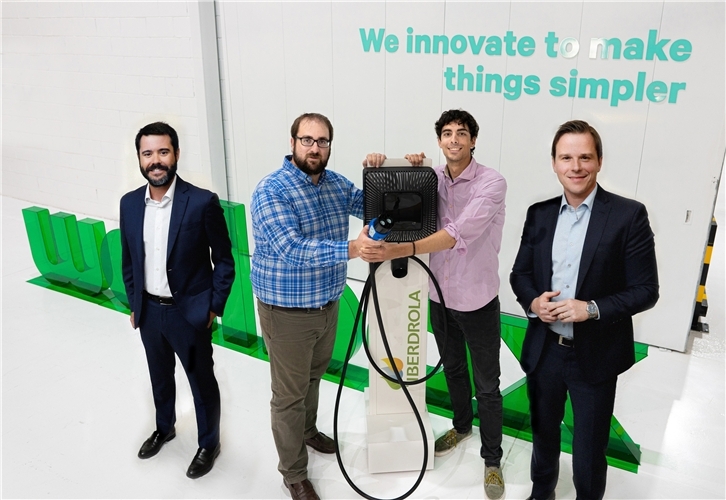News
-
16/07/2019EIB, Spain’s ICO and Iberdrola sign green facility for Europe’s largest PV plant under construction, located in Spain The European Investment Bank (EIB ) and the Instituto de Crédito Oficial (ICO ) will finance the development of the Núñez de Balboa photovoltaic (PV) solar plant, which Iberdrola is currently building in Extremadura (Spain). With 500 megawatts (MW) total capacity and a surface area of nearly 1,000 hectares, the plant is the largest PV project under construction in Europe. It will be able to supply clean energy to 250,000 people, more than the combined population of the cities of Cáceres and Badajoz, and will avoid the emission into the atmosphere of 215,000 tonnes of CO2 per year. This green finance agreement was signed in Madrid by EIB Vice-President Emma Navarro, ICO President José Carlos García de Quevedo and Iberdrola Chairman Ignacio Galán. The EU bank will lend €145 million and the ICO up to €140 million to the company's new renewable energy project, whose total investment exceeds €290 million. Núñez de Balboa is located between the Badajóz province municipalities of Usagre, Hinojosa del Valle and Bienvenida. Commissioning is planned for 2020 and during its construction phase over 1,000 people will be employed by the project, which includes the grid connection infrastructure. During the signing ceremony in Madrid, EIB Vice-President Emma Navarro stated: "We are very pleased to support a project that will strengthen Spanish and European leadership in the transition to a low-emission economy. Our participation proves EIB's strong commitment to climate action. The EU bank is the largest multilateral finance provider for projects that contribute to the fight against climate change, such as this one that reduces polluting emissions while generating economic growth and jobs." The President of ICO, José Carlos García de Quevedo, has declared that "the operation signed today strengthens the support for financing investments in energy efficiency or the production of energy from renewable and non-polluting sources. This financing is part of the ICO Group's global strategy which includes sustainability criteria to perform its activities." The Chairman of Iberdrola, Ignacio Galán, explained that "with this new agreement we are securing our investment in Núñez de Balboa and we continue to make progress towards the objective of tripling our wind and solar capacity in Spain by 2030". The facility signed with EIB and ICO is also in line with "Iberdrola's commitment to a sustainable energy model that allows the transition to a low-carbon economy," said Galán. EIB and climate action As the largest multilateral provider of climate finance worldwide, the EIB's objective is to spend at least 25% of its investments on climate change mitigation and adaptation, supporting low-carbon and climate-resilient growth. In 2018, the European Investment Bank exceeded its climate action target for the ninth year running, providing €16.2 billion to fight climate change, representing 29% of all its financing. Mobilising funding for the fight against climate change is a priority for the EU bank. Its objective is to lead the mobilisation of the necessary funding to keep global warming below 2˚C and limit the temperature increase to 1.5˚C in order to meet the objectives of the Paris Agreement. The European Investment Bank is the largest global issuer of green bonds and pioneered the first bond issue in this market. The EIB is the European Union's long-term financing institution whose shareholders are its Member States. The EIB provides long-term financing for viable investment projects in order to contribute to the achievement of EU policy objectives. ICO and its commitment to sustainability The Instituto de Crédito Oficial (ICO) is a public business institution within Spain’s Ministry of Economy and Business. The ICO has become a benchmark in the financing of both SMEs and large investment projects. The ICO contributes to sustainable growth by financing the economic activities which, due to their social, cultural, innovative or environmental relevance, deserve promotion and development. Within the framework of its current global strategy, the ICO Group has incorporated sustainability criteria into the way it performs its activities. In this regard, it is worth highlighting the recent launch of the ICO's first green bond issue for €500 million, which will be used to finance activities, investments and projects by Spanish companies that contribute to environmental protection and the fight against climate change. In addition to being a leading issuer and catalyst for the transition of the financial and venture capital sector towards a sustainable economic development model, the ICO promotes sustainability as the cornerstone that supports all its aspects – both in its asset and liability operations as well as in its internal organisation and functioning – and as an essential part of the Institute's Corporate Social Responsibility policies. Iberdrola, committed to sustainable development Iberdrola is a global energy leader, the number-one producer of wind power, and one of the world’s biggest electricity utilities by market capitalisation. The company supplies almost 100 million people in dozens of countries including Spain, the United Kingdom (ScottishPower), the United States (AVANGRID), Brazil (Neoenergia), Mexico, Germany, Portugal, Italy and France. With a workforce of 34,000 and assets in excess of €113bn, it achieved a turnover of €35bn and a net profit of €3bn in 2018. Iberdrola is leading the transition towards a sustainable energy model through investments in renewable energy, smart grids, large-scale energy storage and digital transformation, offering the most advanced products and services to its customers. Thanks to its commitment to clean energy, Iberdrola is one of the companies with the lowest emissions and an international benchmark for its contribution to the fight against climate change and for sustainability. Iberdrola has become the world’s largest issuer of green bonds at corporate level with nearly €10 billion. The company has also been a pioneer in taking out green loans: in February 2017 it signed the first green loan for an energy company with BBVA, and in April 2018, in Mexico, the first operation of this type carried out in Latin America, amounting to $500 million and $400 million, respectively. This joint operation between the EIB and the ICO is in addition to the two green loans recently signed by Iberdrola with both institutions to finance the Tâmega hydroelectric pumped-storage scheme in Portugal. READ MORE
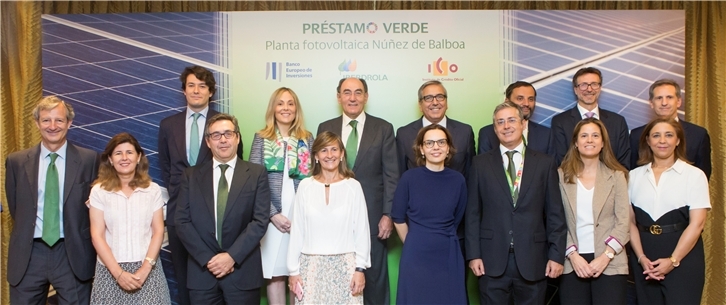
-
15/07/2019Iberdrola reaffirms its role as the main driving force behind women's sport The acting minister or Culture and Sport, José Guirao, and the chairman of Iberdrola, Ignacio Galán have extended the agreement which made the company the main driving force behind the Higher Sports Council (CSD) Women's Universe Programme. The event, which took place today in Madrid at the High Performance Centre (Centro de Alto Rendimiento (CAR)) of the Higher Sports Council was also attended by the president of the Higher Sports Council, the Secretary of State for Sport, María José Rienda, and the presidents of sports federations and athletes representing the 16 federations supported by Iberdrola. The purpose of this agreement is to nurture and develop women's sport as an instrument for recognising women's importance in sport and in society in general. In 2016, Iberdrola became the first company to make a global commitment to encourage women’s participation in sport under the same conditions as men. As things currently stand, the company supports 16 federations (gymnastics, triathlon, rugby, canoeing, badminton, football, hockey, volleyball, table tennis, athletics, karate, boxing, surfing, ice sports and fencing), lending its name to 22 leagues, all at the top level, and it also provides backing to over 35 sportswomen. The agreement has increased the number of federated members in these 16 disciplines by 32%, of whom there are now 316,500. The company also helps by the providing necessary infrastructure in terms of installations, transport, other medical services, referees and other technical support, improving the competitions as well as the clubs’ ability to monitor their performance. These interventions and additional resources are translating into a higher level of competition and are allowing many of the elite Spanish athletes, who have had to moved abroad to pursue their careers, to come back and compete in Spain. Sport, crucial for promoting equality Iberdrola, as set out in the equal opportunities and work-life balance policy approved by the Board of Directors, believes that equal opportunities between men and women are among the companies essential values. With this commitment, the company is improving success in women's sport, encouraging equal opportunities and promoting healthy habits in society from an early age. According to Iberdrola, the most ambitious challenge is to promote women's sport and help to increase its visibility, its achievements and the creation of new role models in society. The company also drives and disseminates the role of women in sport by means of the ‘Women's Universe Tour’ , an initiative from the Higher Sports Council, the Fundación Deporte Joven and Iberdrola, which launched the third tour in June. The purpose of this sports format is to travel around several Spanish cities to transmit the ideas of effort and improvement through the practice and exhibition of different disciplines and to spread the news of the successes achieved by Spanish athletes. Recently, Iberdrola and the Royal Spanish Football Federation (Real Federación Española de Fútbol (RFEF)) presented the Spanish Women's Football Team as the first Sustainable Team, in order to raise awareness of the importance of renewable energies and sustainability as a way of combating climate change. Iberdrola, committed to the SDGs Iberdrola has fully incorporated the Sustainable Development Goals (SDG) into its strategy. The goals are part of the 2030 Agenda and were approved by the UN in September 2015. By supporting women in sport, Iberdrola is focusing its efforts on gender equality and female empowerment (Goal 5), health and well-being (Goal 3) and promoting public-private initiatives (Goal 17), such as this alliance with the Higher Sports Council (Consejo Superior de Deportes (CSD)). READ MORE
-
04/07/2019Galán and the Queen, with the 7s rugby players The chairman of Iberdrola, Ignacio Galán, accompanied this morning HM Queen Letizia during her visit to the Spanish Women's Sevens Rugby Team, at Ciudad Universitaria in Madrid, to show support for the team before the Pre-Olympic tournament in Kazan (Russia), which will be held on 13 and 14 July. Convinced that sport is a key tool for progressing towards gender equality, the company supports 16 federations (gymnastics, triathlon, rugby, canoeing, badminton, football, handball, hockey, volleyball, table tennis, athletics, karate, boxing, surfing, ice sports and fencing) and lends its name to 22 national leagues in different sports, backing over 22,000 sportswomen. The visit was also attended by the acting minister of Culture and Sport, José Guirao; the chairwoman of the Spanish Sports Council and Secretary of State for Sport, Maria José Rienda; the vice-rector of Culture, Sport and University Extension at the Universidad Complutense de Madrid, Isabel María García Fernández, and the president of the Spanish Rugby Federation, Alfonso Feijoo. READ MORE

-
03/07/2019Iberdrola and the Basque Energy Board (EVE) create a company to promote renewable projects in the Basque Country Iberdrola and the Basque Energy Board (EVE) reinforce their commitment to green energy with the creation of a joint venture to promote projects with which they will invest in renewable energies in the Basque Country. This step materializes after the agreement of intentions signed between both institutions in March for the joint development of wind and photovoltaic projects in the three territories of the Basque Autonomous Community. Since then, the energy company and EVE have begun to evaluate sites with access to the electricity grid, as well as the availability of wind resources in some areas with wind potential. This common task of promoting projects from the public-private initiative coincides with the interest of both entities to continue promoting the energy transition through the development of competitive, clean and sustainable energy, which advances in the reduction of energy dependence and generates quality employment. This initiative is aligned with the objectives, among others, of the Basque Energy Strategy 2030, with the agreement of the Basque Parliament which urges institutions to strengthen their commitment to renewables and with the processing of a new Territorial Sector Plan for Renewable Energies that will serve, in the future, as a roadmap through the development of a reference map for the different modalities of renewables. It also responds to the commitments set out in the Paris Agreement on emissions and to the indications set out in the European Commission's "Clean Energy for All Europeans" package. Historic partners Iberdrola and the Basque Energy Board have collaborated over the years on numerous renewable projects in the Basque Country, such as the construction and promotion of the Elgea, Urkilla and Badaia wind farms in Alava-Araba, as well as Oiz in Bizkaia, all of which were inaugurated thanks to public support and collaborations with leading companies in the industry. Likewise, both entities are driving forces behind the BIDELEK project and the most recent BIDELEK 4.0 for the digitalisation of electricity distribution, which has placed the Basque Country at a pioneering level in the implementation of intelligent networks, which represents a great advance in efficiency, consumption management and the capacity to assume new needs such as the implementation of the electric vehicle and distributed generation by means of renewables. As part of its commitment to renewable projects, Iberdrola is also part of the Ekian project group of companies, which with its 24 megawatts (MW) is the largest photovoltaic plant in the Basque Country and will double the installed power of this type of technology in the Basque Autonomous Community. Ekian, located in Ribera Baja (Alava/Araba), is driven by KREAN (LKS/Engineering) and the Basque Energy Organisation and will start its activity at the end of this year. Strong investment in renewables Iberdrola is the biggest producer of wind energy in Spain, with installed power of 5,770 megawatts (MW) and a total installed renewable capacity (wind and hydroelectric) of 15,789 MW. The company is building 700 megawatts (MW) in new renewable projects and has 2,500 MW under development and a portfolio in excess of 7,000 MW. By 2022, Iberdrola plans to start up 3,000 new renewable MW in the State. In the Basque Country, Iberdrola has a renewable installed capacity of 268 megawatts (MW): 143 MW correspond to wind energy. Globally, Iberdrola's renewable installed capacity is over 29,000 MW, which makes its generation capacity one of the cleanest in the energy sector. READ MORE
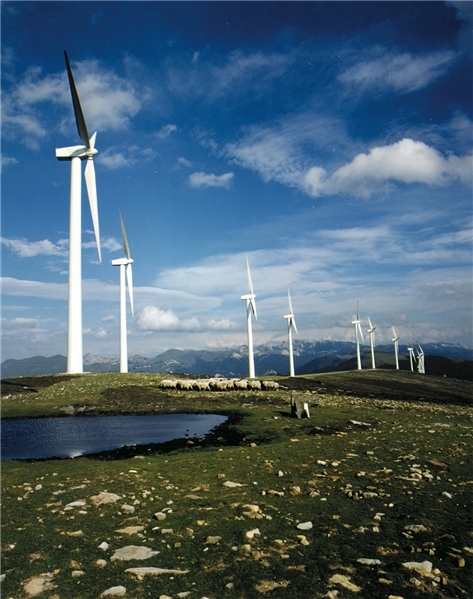
-
02/07/2019Iberdrola ranked in the FTSE4Good index for the tenth consecutive year Iberdrola has been included, for the tenth consecutive year, in the prestigious FTSE4Good international index, designed to encourage investment in the world’s most sustainable companies. The company has succeeded in meeting the strict requirements imposed by the committee that decides who will be included in the index. This decision is based on an increasingly demanding methodology consisting of 195 indicators, which include environmental conservation, social commitment and corporate governance. Appearing in the FTSE4Good index reaffirms Iberdrola’s success with work standards, human rights, safety and health, biodiversity, climate change, water and customer responsibilities and social aspects of the supplier chain. Likewise, the company has complied with the organisation’s corporate governance, risk management, anticorruption mechanisms and tax transparency requirements. Iberdrola already has a capacity of almost 29,500 megawatts (MW) of renewable electricity generation and it is a world leader in wind energy with more than 16,000 MW of installed power, both onshore and offshore. Iberdrola is the only power company in Europe to have been included in all 19 editions of the Dow Jones Sustainability Index (DJSI), a clear sign of its strong commitment to sustainability and recognition of its strategy, which has responded successfully to the main economic, environmental and social challenges of the international energy policy. Added to this is the group’s presence in the main international sustainability index's, which include MSCI, Sustainalytics, ISS-oekom, Bloomberg GEI, Euronext Vieto Eiris índices, Global100, EcoVadis, etc. Contribution to the Sustainable Development Goals (SDGs) Iberdrola has incorporated the Sustainable Development Goals (SDGs) defined by the United Nations for the 2015-2030 horizon into its business strategy and its sustainability policy, and it is a benchmark for its direct contribution to global objectives, particularly in its contributions in the field of energy and climate change. The group has proven that it is firmly committed to achieving the Sustainable Development Goals (SDG) of the UN Agenda 2030 by being ranked, yet again, on the FTS4Good index. The company focuses its efforts on the supply of affordable and clean energy (Goal 7) and on climate action (Goal 13) whilst also contributing directly to ensuring clean water and sanitation (Goal 6), increasing its investment in R&D&I activities (Goal 9), promoting respect for the life of terrestrial ecosystems (Goal 15) and working to establish partnerships to achieve the goals (Goal 17). Furthermore, Iberdrola has always shown its commitment to reducing emissions to combat climate change and move towards the decarbonisation of the economy. The company has set the new environmental objective of achieving a 50% reduction in its CO2 emission intensity by 2030 over 2007 levels, and of being carbon neutral by 2050. Because of its generation mix, investments profiles and commitments, Iberdrola is a key stakeholder in the electricity sector’s contribution to decarbonisation of the global economy. READ MORE

-
01/07/2019Neoenergia, a subsidiary of Iberdrola, debuts on the São Paulo Stock Exchange, Brazil’s largest energy sector placement since 2000 São Paulo. Today, Neoenergia, a subsidiary of Iberdrola, marked a new milestone in the group’s history when it began trading in the Novo Mercado segment of the São Paulo B3 stock market (formerly Bovespa). This is the largest initial public offering (IPO) so far this year and the most relevant in Brazil’s energy sector since 2000. With a market capitalization of about R$19 billion, Neoenergia becomes the main private electricity utility, active in the networks business, listed on the Novo Mercado. The value of the offer amounted to R$3.255 billion after the sale of 208,044,383 Neoenergia shares, representing 17.139% of its share capital, and after the final price was set at 15.65 Brazilian reais per share. Neoenergia will continue to play an important role in Brazil's economic and social development in the coming years, responding to the growing demand for sustainable and reliable energy and generating wealth in the country, where it is present in 18 states and serves 34 million customers. The Iberdrola group, through its Brazilian subsidiary, plans to invest €6 billion in Brazil during the 2018-2022 period, as stated in its Strategic Outlook, presented in London in February. Neoenergia’s new share capital structure Following the success of the offer, the resulting share capital of Neoenergia is structured as follows: Iberdrola controls 50% + 1 share, Previ, with 32.9%, continues as a relevant, long-term shareholder, and the remaining 17.139%, being free float. Brazil’s energy leader Through Neoenergia , Iberdrola has become one of the two largest electricity companies in Brazil by number of customers, with 13.9 million supply points. The company focuses its activity on the generation, transmission, distribution and retail of electricity, in an area spanning 835,000 km2. Today, the company has a production capacity in the country of more than 3,700 megawatts (MW), of which almost 88% are renewables. If projects under construction are taken into account, capacity reaches 4,550 MW. Standing out among Iberdrola's clean generation facilities in Brazil, is the recently inaugurated hydroelectric plant of Baixo Iguaçu, with 350 MW output capacity. In addition, the group has more than 600,000 kilometers of electric lines, operated by the four distribution companies integrated in Neoenergia: Cosern, Celpe, Coelba and Elektro. READ MORE
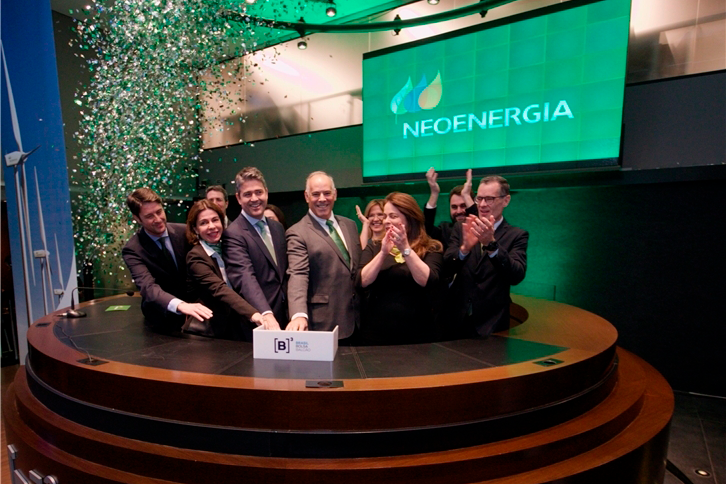
-
26/06/2019i-DE is to invest €600m to convert Spain's main urban hubs into smart cities i-DE , the new branding for Iberdrola's distribution activity in Spain is extending the possibilities of its smart and digitalised network with investments totalling over €600m during the next ten years aimed at helping the country's main urban areas to move forward in their transition towards becoming "smart cities". The investments in this project will be mainly earmarked for improved grid developments in order to integrate key energy resources for the development of a smart city, as well as going towards raising the intelligence of the distribution grid by boosting digitalisation and thereby improving the quality of information and service. Optimum "smart city" model for more than 40 Spanish cities i-DE, which is already working on this initiative with a number of Municipal Councils and Autonomous Regions, expects to extend the project to over 40 Spanish towns and cities during 2019, including provincial capitals and cities of over 100,000 inhabitants, in the regions where it operates as distributor. “Smart grids have become one of the keys in the process of decarbonising our economy and in the energy transition, paving the way for the integration of electric mobility and renewable energy for a cleaner and more centralised energy mix”, explains Juan Ríos, director of Planning and Regulation for i-DE. The deployment of our smart electricity grid is allowing us to incorporate ‘neural tracking’ of the grid to provide the public with a better service. The work of i-DE, in collaboration with local and regional administrations, is centred on 4 strategic areas for a smart city, from the perspective of the electricity grid, which include electric mobility, grid infrastructures, efficient energy use and raising public awareness: * Mobility. i-DE is sharing its knowledge of electricity grids with Municipal Councils to drive forward a plan for the deployment of efficient and economical electric charging stations accessible to all the public; * Infrastructure. Boosting of the development, innovation and digitalisation of networks to continue improving those aspects that affect supply quality and customer service. * Energy. Searching for sustainable energy solutions and improvements in efficient energy use, based on the value of the data that the smart grid provides to citizens and administrations. * Culture. Generating content and, through IT, data at local level about the grid, with regard to (1) electricity consumption both in the city and of electric vehicles; (2) renewable generation and (3) the penetration of electric mobility; all with a view to encouraging optimal management and contributing to raising public awareness. Monitoring and assessment of the impact of electric vehicles on the grid Iberdrola's distribution arm's initiatives to promote a cleaner, more efficient and sustainable energy model also favour the integration of the electric vehicle. i-DE has integrated Electric Mobility Control Centres into its 6 Distribution Control Centres in Spain with which to monitor and assess the impact of electric vehicles on its distribution network. The centres provide real-time information about charging points: locations by zones, distribution of consumption by province, hourly charge curve of charging points, and CO2 emissions avoided. Likewise, it will be possible to track the progress of charging points and of energy demand. In the near future, as well as analysing the status of the electric vehicle charging points connected to the grid, the integration of data analysis tools will make it possible to predict the impact of electric vehicles. In line with its smart city strategy, the Electric Mobility Control Centres will allow i-DE to work with Municipal Councils and Autonomous Regions, providing them access to local information about the development of electric vehicles in their communities. “This data will help in the integration of the electric vehicle into the grid, and enable the rationalisation of investment in new infrastructure and the provision of flexible grid services, as well as maintaining the security and quality of supply”, explains Ríos. Smart grids and the energy transition Electricity distribution networks are the circulatory system of the new energy model and the platform necessary for the transition toward a decarbonised economy based on renewable and competitive energy. The transformation of networks towards a smart, more reliable and safer infrastructure will provide a response to the challenges of this transition towards the electrification of the economy, with a higher presence of renewables, sustainable mobility, smart cities, decentralised consumption (self-generation) and a consumer with greater decision-making capability and connectivity. Iberdrola has installed almost 11 million smart meters in Spain together with their supporting infrastructure, as well as adapting around 90,000 transformer centres, where remote management, supervision and automation capabilities have been incorporated. i-DE, Smart Electricity Grids The activities of i-DE - the new name for Iberdrola's electricity distribution arm - include the planning, construction and maintenance of power lines, substations, transformer centres and other infrastructure, as well as operating the system in a way that efficiently distributes energy among the various agents that produce and consume it. i-DE operates a distribution system consisting of 270,000 km of power lines in Spain and is present in 10 Autonomous Regions serving a population of 17 million. In 2018, Iberdrola's distribution business invested almost €500m in Spain in projects designed to improve its procedures and customer service channels; the completion of the roll-out of nearly 11 million smart meters and the supervision and automation of the grid. Iberdrola's network business is a significant driver of the Spanish economy, generating more than 10,000 jobs in total (both direct and through its suppliers). In 2018, the company made purchases to the value of €500m from 2,000 local companies. READ MORE
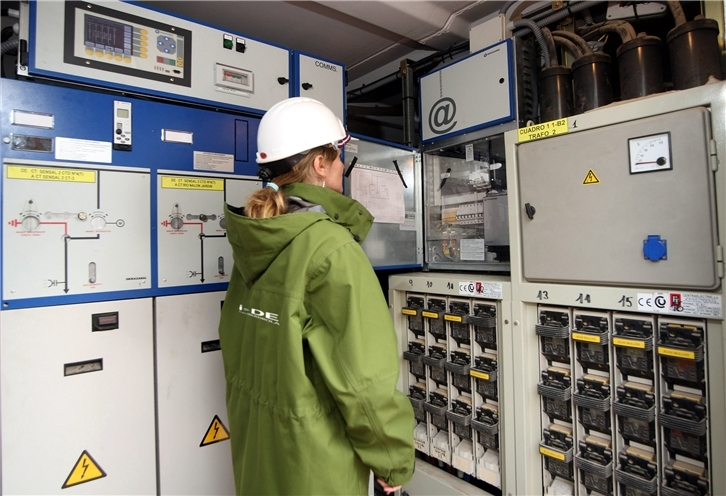
-
24/06/2019Iberdrola is investing in Wallbox to lead innovation in sustainable mobility Iberdrola is making strides in its strategy to promote innovative sustainable mobility to fight climate change by acquiring a stake in Wallbox. This company, Europe's leading electric vehicle charging solutions company, has completed a €15 million round of capital injections – led by Iberdrola, with other co-investors and some of Wallbox’s current partners – which will allow it to reinforce its leadership and undertake global expansion. The operation strengthens the business partnership between both companies and, fits into Iberdrola's Sustainable Mobility Plan, which includes rolling out 25,000 electric vehicle charging stations throughout Spain by 2021 and in the company's other global markets. Iberdrola has made this investment through its Perseo start-up programme, which supports emerging companies developing key technologies to future energy developments. “The operation is one of our main strategies for continuing to lead the energy transition to a low-carbon economy: innovation to identify and develop new technologies that will enable us to improve the energy sustainability model; and our commitment to electrifying transportation , as a way to combat climate change,” explained Luis Buil, Iberdrola Smart Mobility manager. “This capital increase allows us to continue the development of our ambitious product roadmap, accelerate the company's growth and become the leading global brand in charging solutions for electric vehicles and energy," said Enric Asunción, CEO of Wallbox. The sustainable mobility leader Iberdrola intends to drive and lead the transition to sustainable mobility and the electrification of transport as an effective way to combat climate change. The company has a Sustainable Mobility Plan that entails deploying 25,000 electric vehicle charging stations in Spanish homes, companies, urban and suburban areas with public access by 2021. The plan includes installing fast, super-fast and ultra-fast charging stations at least every 100 km on the country’s main motorways and highways during 2019, making it possible to drive all the way across Spain in an electric vehicle. To achieve this, Iberdrola is working on several initiatives to mobilise all agents involved in sustainable mobility, from governments to institutions, companies and electric vehicle manufacturers. Perseo, collaboration with start-ups to design the energy of the future Innovation is a strategic variable for Iberdrola and the main tool for guaranteeing the company's sustainability, efficiency and competitiveness. Iberdrola has been collaborating with start-ups for over ten years through its €70 million Perseo Programme . Perseo helps the company to gain access to the technologies of the future and fosters the development of a dynamic, global ecosystem of technology companies and entrepreneurs that will improve the sustainability of the energy model. Through Perseo, Iberdrola has brought more than 2,000 emerging companies into its ecosystem, developed pilot projects, over 30 of them in the last two years, and invested in 15 start-ups in areas such as energy storage, drones, robotics and artificial intelligence. Wallbox, working towards a change in the mobility paradigm Wallbox plans to become a global electric vehicle charging solutions supplier (smart chargers and the myWallbox platform) and is still at the forefront of the sector with the launch of a home DC charger in the second half of the year. The initiative will be top of its class due to its features and bidirectional technology. It has already been assessed by the market and agreements have already been signed with major car manufacturers. This new technology will bring a disruptive change to electric vehicle charging systems worldwide. READ MORE
